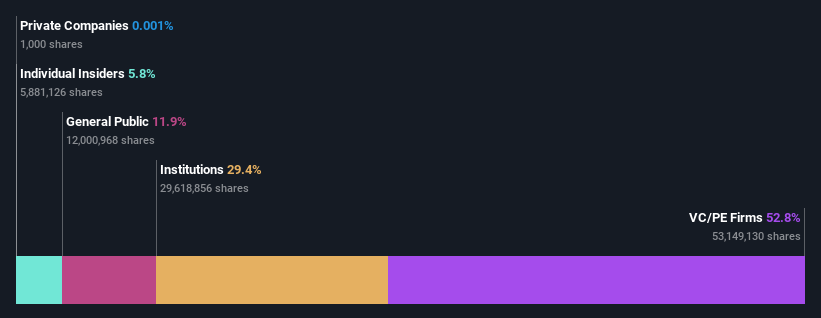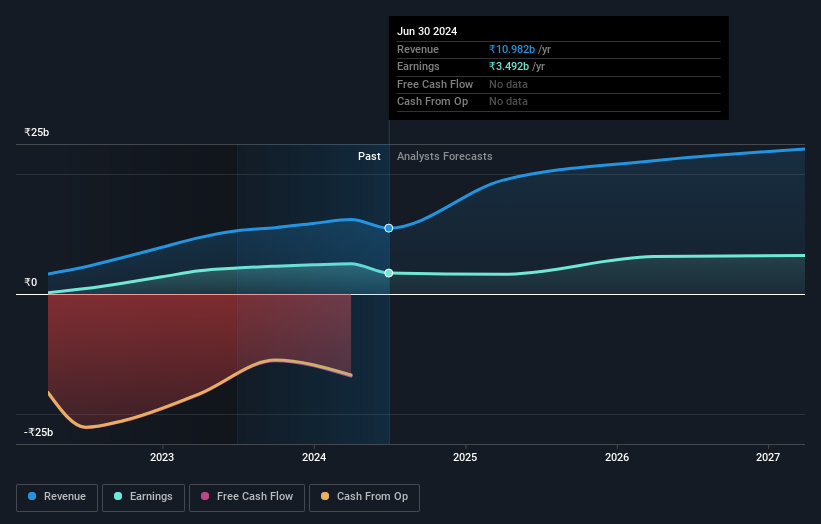- India
- /
- Consumer Finance
- /
- NSEI:FUSION
Private equity firms who have a significant stake must be disappointed along with institutions after Fusion Finance Limited's (NSE:FUSION) market cap dropped by ₹2.7b

Key Insights
- Significant control over Fusion Finance by private equity firms implies that the general public has more power to influence management and governance-related decisions
- The top 3 shareholders own 53% of the company
- 29% of Fusion Finance is held by Institutions
To get a sense of who is truly in control of Fusion Finance Limited (NSE:FUSION), it is important to understand the ownership structure of the business. And the group that holds the biggest piece of the pie are private equity firms with 53% ownership. In other words, the group stands to gain the most (or lose the most) from their investment into the company.
While institutions who own 29% came under pressure after market cap dropped to ₹20b last week,private equity firms took the most losses.
In the chart below, we zoom in on the different ownership groups of Fusion Finance.
Check out our latest analysis for Fusion Finance

What Does The Institutional Ownership Tell Us About Fusion Finance?
Institutional investors commonly compare their own returns to the returns of a commonly followed index. So they generally do consider buying larger companies that are included in the relevant benchmark index.
Fusion Finance already has institutions on the share registry. Indeed, they own a respectable stake in the company. This implies the analysts working for those institutions have looked at the stock and they like it. But just like anyone else, they could be wrong. When multiple institutions own a stock, there's always a risk that they are in a 'crowded trade'. When such a trade goes wrong, multiple parties may compete to sell stock fast. This risk is higher in a company without a history of growth. You can see Fusion Finance's historic earnings and revenue below, but keep in mind there's always more to the story.

Fusion Finance is not owned by hedge funds. Our data shows that Warburg Pincus LLC is the largest shareholder with 33% of shares outstanding. The second and third largest shareholders are Creation Investment Fusion,Llc and Creation Investments Capital Management, LLC, with an equal amount of shares to their name at 10.0%. Additionally, the company's CEO Devesh Sachdev directly holds 4.9% of the total shares outstanding.
After doing some more digging, we found that the top 3 shareholders collectively control more than half of the company's shares, implying that they have considerable power to influence the company's decisions.
While studying institutional ownership for a company can add value to your research, it is also a good practice to research analyst recommendations to get a deeper understand of a stock's expected performance. There are plenty of analysts covering the stock, so it might be worth seeing what they are forecasting, too.
Insider Ownership Of Fusion Finance
The definition of an insider can differ slightly between different countries, but members of the board of directors always count. Management ultimately answers to the board. However, it is not uncommon for managers to be executive board members, especially if they are a founder or the CEO.
Insider ownership is positive when it signals leadership are thinking like the true owners of the company. However, high insider ownership can also give immense power to a small group within the company. This can be negative in some circumstances.
We can report that insiders do own shares in Fusion Finance Limited. As individuals, the insiders collectively own ₹1.2b worth of the ₹20b company. It is good to see some investment by insiders, but it might be worth checking if those insiders have been buying.
General Public Ownership
The general public-- including retail investors -- own 12% stake in the company, and hence can't easily be ignored. This size of ownership, while considerable, may not be enough to change company policy if the decision is not in sync with other large shareholders.
Private Equity Ownership
With an ownership of 53%, private equity firms are in a position to play a role in shaping corporate strategy with a focus on value creation. Sometimes we see private equity stick around for the long term, but generally speaking they have a shorter investment horizon and -- as the name suggests -- don't invest in public companies much. After some time they may look to sell and redeploy capital elsewhere.
Next Steps:
It's always worth thinking about the different groups who own shares in a company. But to understand Fusion Finance better, we need to consider many other factors. Be aware that Fusion Finance is showing 1 warning sign in our investment analysis , you should know about...
If you would prefer discover what analysts are predicting in terms of future growth, do not miss this free report on analyst forecasts.
NB: Figures in this article are calculated using data from the last twelve months, which refer to the 12-month period ending on the last date of the month the financial statement is dated. This may not be consistent with full year annual report figures.
New: AI Stock Screener & Alerts
Our new AI Stock Screener scans the market every day to uncover opportunities.
• Dividend Powerhouses (3%+ Yield)
• Undervalued Small Caps with Insider Buying
• High growth Tech and AI Companies
Or build your own from over 50 metrics.
Have feedback on this article? Concerned about the content? Get in touch with us directly. Alternatively, email editorial-team (at) simplywallst.com.
This article by Simply Wall St is general in nature. We provide commentary based on historical data and analyst forecasts only using an unbiased methodology and our articles are not intended to be financial advice. It does not constitute a recommendation to buy or sell any stock, and does not take account of your objectives, or your financial situation. We aim to bring you long-term focused analysis driven by fundamental data. Note that our analysis may not factor in the latest price-sensitive company announcements or qualitative material. Simply Wall St has no position in any stocks mentioned.
About NSEI:FUSION
Fusion Finance
A non-banking financial company, provides micro finance lending services to women entrepreneurs in rural and semi-urban areas in India.
High growth potential and good value.


